The Office of the Special Prosecutor (OSP) has filed 78 criminal charges against former Finance Minister Ken Ofori-Atta, accusing him of orchestrating and overseeing a scheme that led to the award of massive government contracts to Strategic Mobilisation Ghana Limited (SML) in ways the OSP describes as unlawful, deceptive and financially damaging to the state.
The charges, filed at the High Court, mark the most sweeping corruption prosecution brought against a former minister since the OSP was established. Ofori-Atta, who left office in 2024, is accused alongside seven others, including former senior officials of the Ghana Revenue Authority (GRA), former technical advisers at the Ministry of Finance, and the owner of SML, Evans Adusei. SML itself is named as a corporate defendant.
At the heart of the prosecution’s case is a set of contracts awarded between 2017 and 2024 for revenue-assurance services in the petroleum and minerals sectors.
The OSP alleges that Ofori-Atta and the other officials approved or facilitated these agreements without following required procurement rules, often using single-source awards without approval from the Public Procurement Authority and, in some cases, without parliamentary oversight.
Prosecutors say the contracts were supported by representations from SML that it possessed proprietary technology, international partnerships and technical capacity which, according to the OSP, were materially false.
Prosecutors argue that these representations induced state agencies to commit to long-term, high-value contracts with SML, including one agreement that carried a potential state exposure of more than US$2.7 billion.
The OSP further alleges that SML was placed on an “automatic payment” mode, where funds were released without sufficient verification of actual performance or delivery of services. Investigators say these arrangements caused enormous financial losses to the country and violated procurement, anti-corruption and public-financial-management laws.
Ofori-Atta did not present himself for scheduled interviews with the OSP earlier in the year, prompting the Special Prosecutor to declare him a fugitive after he said he was undergoing medical treatment abroad. He has since remained outside Ghana.
In June, police sources confirmed that an Interpol Red Notice had been issued at the request of the Ghanaian authorities, a move that signals the government’s intent to compel his return if voluntary cooperation is not forthcoming.
Through his lawyers, Ofori-Atta has denied wrongdoing. His legal team has described the OSP’s actions as politically driven and says the former minister is prepared to defend himself once he is medically cleared to travel.
They reject the allegation that he evaded law-enforcement processes, arguing that he communicated his medical absence to the OSP and that the declaration of fugitive status violated his rights.
The case has drawn widespread public attention because of the profile of the accused and the scale of the alleged financial harm. Analysts say the prosecution represents a major test of the OSP’s capacity and independence, especially given the technical nature of the contracts and the high stakes involved.
Anti-corruption campaigners have praised the decision to bring charges, describing it as the type of case the OSP was established to pursue. Others remain sceptical, citing past failures to secure convictions in major corruption cases.
The court is expected to set dates for the first appearance of the accused, though it remains unclear when or whether Ofori-Atta will return to the country to stand trial.
The outcome of the case carries significant implications for public-sector contracting, political accountability and the credibility of the anti-corruption framework.
As the prosecution moves forward, observers will be watching whether the OSP can translate its sweeping allegations into a successful courtroom strategy and what the case will mean for future governance and procurement reforms in Ghana.






